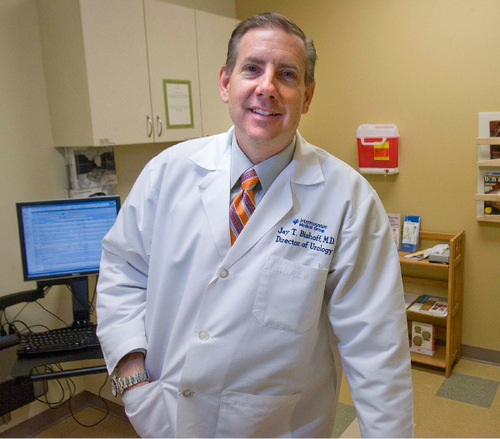This is an archived article that was published on sltrib.com in 2011, and information in the article may be outdated. It is provided only for personal research purposes and may not be reprinted.
About a year ago, the chief of urology at Intermountain Medical Center got a phone call from a Walmart pharmacist who wanted to confirm a prescription for the painkiller Vicodin.
"The prescription had my partner's name on it, but it wasn't his signature. It wasn't even our prescription pad," said Jay T. Bishoff, director of the Intermountain Urological Institute in Murray.
But when Bishoff suggested that the West Jordan retailer alert police, he says he was told: "No, we have a policy — we don't call police. We don't want a shootout in our store."
Walmart officials say store policy requires pharmacists to verify prescriptions and notify police of any suspected forgeries. But the retail giant and its warehouse chain, Sam's Club, forbid pharmacy workers from assisting police by filling such prescriptions to allow an immediate arrest.
Other pharmacies facilitate on-site arrests by reporting crimes as they're happening. That's true for Kmart, Costco and even smaller stores such as Jolley's Corner Pharmacy in Salt Lake City.
"We'll cooperate in whatever way possible to nab a person before they leave. It's one thing to pass a forged prescription, but you have a stronger case if you catch someone in possession of an illegal narcotic," said owner Bryce Jolley. "That's been our policy for years."
Narcotics abuse is the nation's leading drug problem, mostly fueled by the ready availability of legally prescribed drugs in medicine cabinets throughout the country. But prescription fraud plays a growing role and is especially troubling to physicians who want to protect their reputations and patients from harm.
Knowingly dispensing a prescription drug to anyone "attempting to obtain [it] by fraud or misrepresentation" is a violation of the Utah Controlled Substances Act and Pharmacy Practice Act. Violators can be charged with a third-degree felony.
But there is no law requiring pharmacies to report fraud.
Wal-Mart spokesman Dan Fogleman contends the retailer often works closely with law enforcement, saying, "Our pharmacies take our obligation to comply with state and federal law very seriously."
And West Jordan police Sgt. Drew Sanders says Walmart has "been nothing but great to work with. We absolutely love them."
Of the two major pharmacy locations in West Jordan, police said Smith's Food and Drug had two incidents reported during the past two years. Walmart had one in 2009.
But Kevin Wyatt, a former state insurance fraud investigator who now works with the Cottonwood Heights Police Department, said he worked a case in 2008 when a Walmart pharmacist was fired for helping police. "It wasn't a sting operation. We just told her to call us when the suspect returned," Wyatt said.
Fogleman said Wal-Mart had not terminated any pharmacists in the Salt Lake City area in recent years in relation to prescription fraud.
Wyatt said Wal-Mart is not alone in its stand against helping with on-site arrests. He knows of a few small "mom and pop" pharmacies that don't call police because they struggle to compete.
There's a cost to pharmacies who cooperate, Jolley explained. "It's much easier for shops to say, 'I don't have time to mess with this, go away.' Sometimes you have to identify a person in a lineup, testify at trial or file affidavits."
There's also the threat of losing business, said Wyatt. "Some pharmacists are bonused on volume; the more prescriptions they sell, the more money they make."
Douglas Vogeler, a family practice doctor in Sandy, first learned of Walmart's policy in 2007.
He discovered from police that a man had been paying homeless men and women cash to fill fake prescriptions for Lortab under his name.
Over time the man forged 800 prescriptions at various stores, including Walmart, said Vogeler. "The sheer number of pills being passed should have tripped alarms."
Alarmed, Vogeler asked Wal-Mart personnel what they were doing to stop the false use of his name. He says an employee responded, "We don't want to create an incident in our store for which we would be liable for.' "
Wyatt helped investigate the Vogeler case and said though arrests were made, no charges were ever filed.
Bishoff says his complaints last year to the Wal-Mart corporate office were met with suggestions that he be the one to file a report.
He did, and says West Jordan police never pursued it. He's frustrated by the Wal-Mart position.
"The problem with that strategy is you miss critical time," Bishoff said. "In order to mount evidence to prosecute, investigators need to catch someone in the act."



